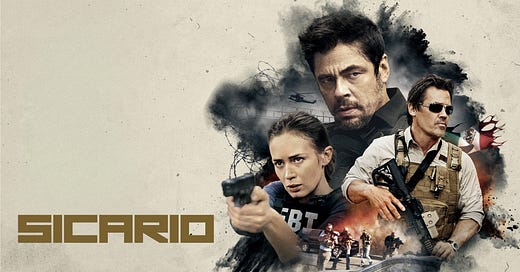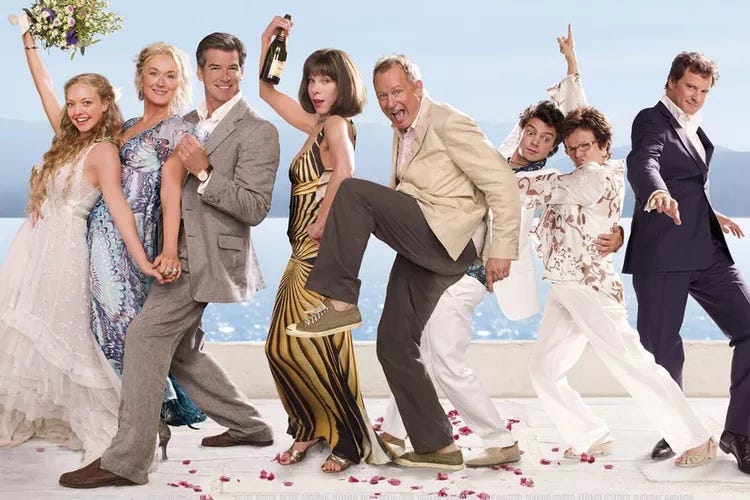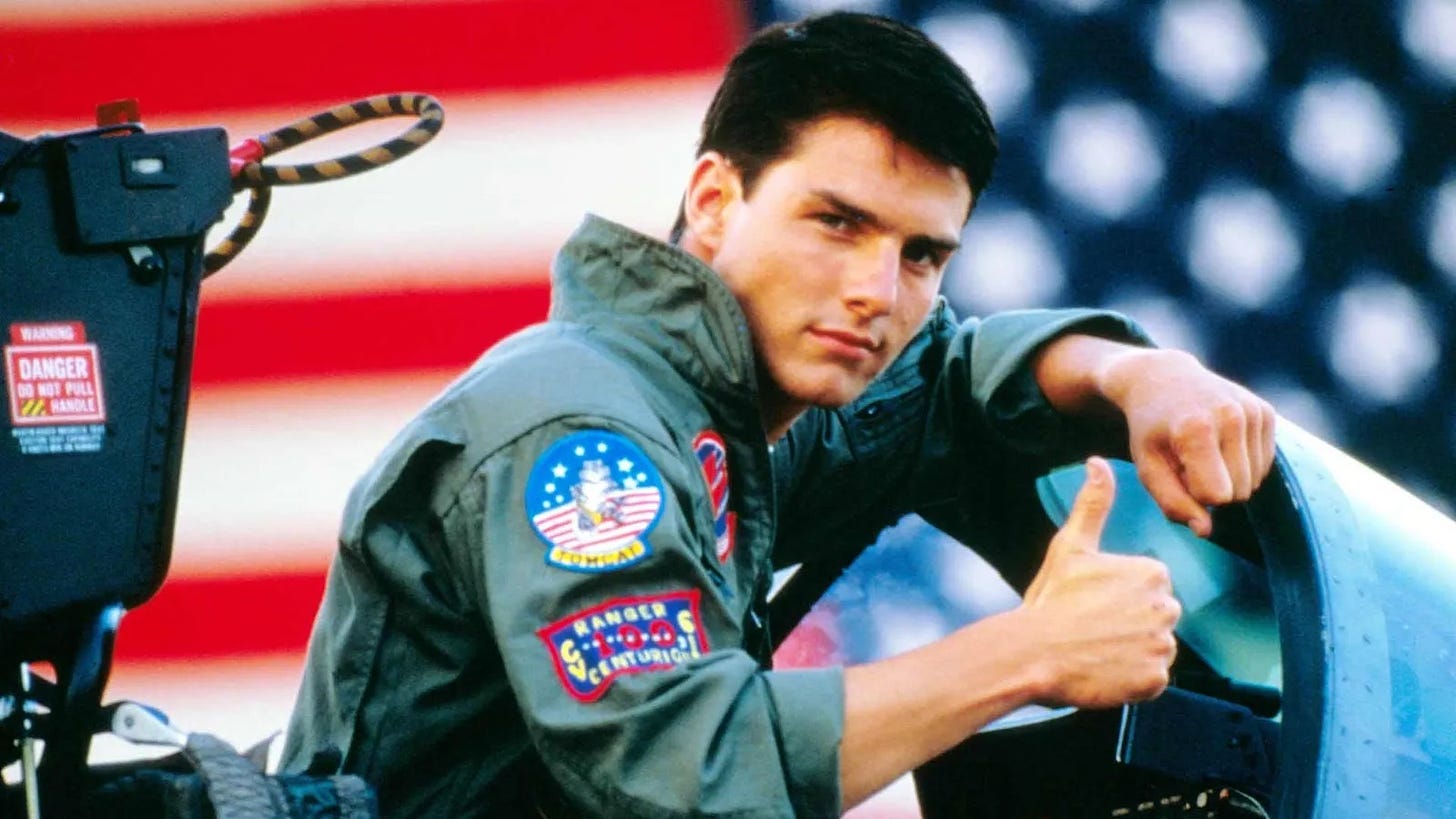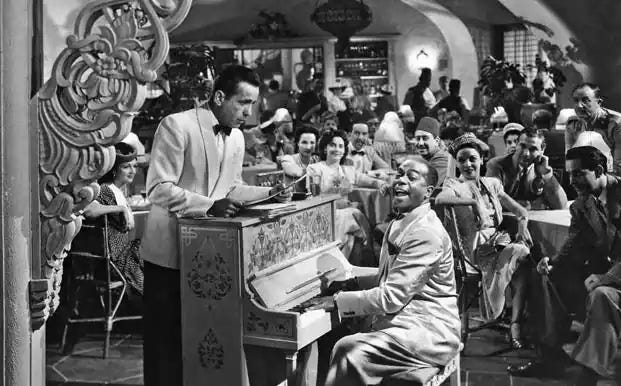I try to be a good cultural citizen, but the math just isn’t in my favor. For every essential movie that friends and family recommend, there are dozens more quality ones released every year, in addition to more prestige television than I could possibly watch in ten lifetimes, even if I swore off time-chomping shark movies tomorrow. Yet occasionally I find the time and motivation to check off a marquee movie off of my ever-lengthening list. Here’s my take on four such iconic movies that I finally watched recently, ranked in order of the gap between when they came out and when I saw them.
Sicario: Hit Man Baby, One More Time
Released in 2015, I finally saw it in 2024
When I watched Dune: Part One at a friend’s apartment I vocally praised the “Star Wars meets Balenciaga” aesthetic. I loved how the production design alternates between high tech, stark, and grotesque, epitomized by how the Harkonnens, seemingly a civilization of very angry potatoes, heal their chief bad boy by bathing him in motor oil. Seeing how much I’d enjoyed Dune and hearing me rave about Arrival, my friends insisted I had to watch Sicario next.
On paper, this is a surprising movie for Denis Villeneuve to make. Set along the El Paso-Ciudad Juarez border during the peak of cartel violence, the premise feels much closer to a boilerplate Hollywood crime drama than to Villeneuve’s bold visions of alien contact or robots longing to be human.
I only later realized that this disorientation is very much intentional. Like Emily Blunt’s Kate Macer, I was lured into this tale under false pretenses, only to realize the darker truth once it was too late. Like Kate, by the end of the movie I’d realized that a world where only bullets speak louder than dollars is a world where ideals and idealists alike die in darkness and only the cruel and indifferent triumph.
You see, if I wrote or directed Sicario, a character would have stated this kind of heavy handed, semi pretentious assertion to shine a spotlight on the film’s thesis, but the brilliance of this movie is that it never force feeds you any such message. Instead, I felt it in the disorienting terror of the best night vision sequence I’ve seen since Zero Dark Thirty, I saw it in the increasingly beige color palate, where primary colors lost their luster and bled into faded grays, and I experienced it in a Hitchcockian pivot as the camera suddenly began following Benicio Del Toro’s Alejandro, who turns out to be the film’s true protagonist. An astute master of film as a visual language, Villeneueve is devoted to conveying his themes impressionistically and indirectly, which makes the story much more immersive. This is a movie that lingers with you for days after you’ve seen it.
Yes, the border crossing sequence is as suspenseful as everyone said and Roger Deakins delivers more Oscar-worthy cinematography, but what really stuck with me was how Sicario is one of the most searing indictments on the war on drugs since David Simon’s The Wire. Villeneuve visualizes the bleak reality that in this kind of conflict, true justice is impossible given the insatiable demand, entangled incentives, and blunt instruments available. All that’s possible is endless violent retribution. As the closing credits rolled I sat dumbstruck, recalling the Bertrand Russell quote: “War doesn’t determine who is right— only who is left.”
Mamma Mia!: Gimme! Gimme! Gimme! (Less Pierce Brosnan Singing!)
Released in 2008, I finally saw it in 2020
We all did what we had to to survive 2020. I made Alexis watch The Last Samurai and The Last of the Mohicans in the same week and in return she made me watch Mamma Mia!. Partway through one of the first musical numbers I realized that her musicals and my action movies are interesting mirrors of each other. They appeal to different demographics for the exact same reasons. One replaces singing with fighting and dance choreography with combat choreography, but both use the bare minimum of plot necessary to rocket onwards to the next indulgent set piece. Rushing to judge either misses that at its core, this kind of movie is an uncomplicated, escapist romp away from the laws of logic, physics, and narrative itself. So just find a way to turn off your inner critic and have fun!
Speaking of which, there is a distinct feeling of “I’m going to require more chardonnay to finish viewing this” that you haven’t felt until you’ve seen this movie. Yet unlike the visual atrocity that was Cats, which I also forced myself to watch in the depths of COVID despair, after the correct amount of wine Mamma Mia! becomes eminently enjoyable. Sure, not all of the ABBA gold sparkles the way it should, but national treasures Meryl Streep and Amanda Seyfried appear to be having a genuinely good time and do their best with the musical numbers thrown at them. This can’t be said for the male cast members. The Miami Herald compared the sounds of Pierce Brosnan attempting to sing to a wounded raccoon. Matt Brunson of Creative Loafing Charlotte was more circumspect, remarking that Brosnan “looks physically pained choking out the lyrics, as if he's being subjected to a prostate exam just outside of the camera's eye.” SOS indeed, Pierce.
Yet the magic of Mamma Mia! is that even these atonal misses are somehow fun to watch. This can’t be said of Les Mis, which Alexis also made me watch during COVID, which convinced me that Russell Crowe should be banned from singing for life.
Top Gun: These Pilots Want You (To Join the Navy?)
Released in 1986, I finally saw it in 2022
Do you know how the director of Top Gun got the job? I do, because this vexing capstone of the Reagan presidency had me spending hours on Wikipedia trying to understand it afterwards. Director Tony Scott had a shot car commercial where Saabs raced fighter jets. This convinced the powers that be that he would be perfect for this movie. I think this is important context, since viewing Top Gun feels less like a coherent film and more like an advertisement for the military industrial complex with a budget big enough to hire Kenny Loggins as artist in residence.
Watching a movie this heavily mythologized and meme-ified is disorienting because even first time viewers have already absorbed much of it via pop culture. What blew me away about the actual movie happening beneath all the jet fueled bromance was how little it does to explain the titular fighter plane competition to you. I had a better understanding of the rules of the Triwizard competition in Harry Potter than I did of the plane contest Tom Cruise is competing in. Instead of explaining terms like “hard deck,” “bogeys,” and “jet wash,” they assume that “jets go whoosh” is a better use of their screen time. I guarantee that if Christopher Nolan shot an adaptation of Top Gun, Joseph Gordon Levitt would be cast just to periodically spout exposition about these planes and their capabilities. Instead, we’re as confused about all the jargon as Kelly McGillis is by Tom Cruise’s attempts at courtship.
I was surprised by how much of this o ne has aged terribly. Watching Tom Cruise follow his crush into the women’s bathroom feels about as uncomfortable as playing beach volleyball in jeans on a hot day, which Cruise also does, in addition to kissing Kelly McGillis with an amount of tongue that would make a chameleon blush. Overall, the homoerotic volleyball montage in my mind didn’t square with the Navy recruitment ad in front of me.
This movie was one of the first to kick off the now omnipresent trend of Hollywood cozying up to the Pentagon, getting access to cool weapons and vehicles to film in exchange for a flattering portrayal of the military, the real highway to the danger zone if you ask me. Yet, you have to hand it to Tom Cruise, who delivered such an iconic performance here that the plot of this movie’s surprisingly good sequel boils down to “there will come a time when we no longer need Tom Cruise, but we’re not there yet.”
Casablanca: Here’s Looking At You, Nostalgia
Released in 1942, I finally saw it in 2024
Having recently seen Jonathan Glazer’s polarizing and devastating film, The Zone of Interest, the first and strongest reaction I had to Casablanca was “they don’t make movies like this anymore and a World War Two movie would never be made like this today.”
So, to name it now, the cynical modern reading of Casablanca is that it’s too simplistic and romantic, marginalizes women and people of color, is overly flattering to the Vichy French, and paints a portrait of World War Two that Hemingway might fantasize about where the most patriotic thing imaginable is drinking a dizzying amount of cocktails in a suave dinner jacket.
However, I found it curious that both this film and The Zone of Interest, while tonally and stylistically worlds apart, are actually similar in that they showcase a small scale story that asks the viewer to reconcile the jarring contrast of normal life in the foreground with great evil happening in the background. However, where The Zone of Interest challenges us by painting a haunting portrait of the banality of evil, Casablanca comforts us by painting a romantic portrait of the banality of good. A closeup of flowers crushes our spirits in one movie with the same efficacy that a spirited rendition of La Marseillaise lifts our spirits in another. Film is a hell of a drug.
While The Zone of Interest scalds you with its conclusions, Casablanca offers some tepid questions about the idea of neutrality. In 2024 it’s easy to say that people like Rick could have or should have done more to openly defy the Nazis, but this movie does a decent job at showing that most of us live small scale lives defined more by personal allegiances and self interest than anything else. Yet sometimes, history forces ordinary people into extraordinary situations and we must decide if we’ll stick our necks out to help others or play it safe. In this light, helping two people including a former lover escape the Nazi regime is both a very small and very large victory for Rick to achieve.
Despite my cynicism and knowing 80 intervening years of history in a way that Rick and the filmmakers couldn’t, the old Hollywood charm got to me eventually. Like countless viewers, I found myself enchanted by the mystique and charisma of Rick and the colorful charm of his cafe. I loved Sam the jazz singer so much that I wanted him to get his own movie. Bogart and Bergman’s performances got me surprisingly invested in this story. Not since British Airways determinedly tried to ruin my vacation have I been in such suspense over if two people will be able to board a plane on time.
We’ll always have Paris…that and the certainty that we’ll never tire of making movies about World War Two.
What do you think about Mamma Mia!, Top Gun, Sicario, and/or Casablanca? I want to know!
Know anyone who is a bigger cinephile than Michael Bolton? Share this with them.
Are you a subscriber? It’s free, fun, and means you’ll never miss a post.






